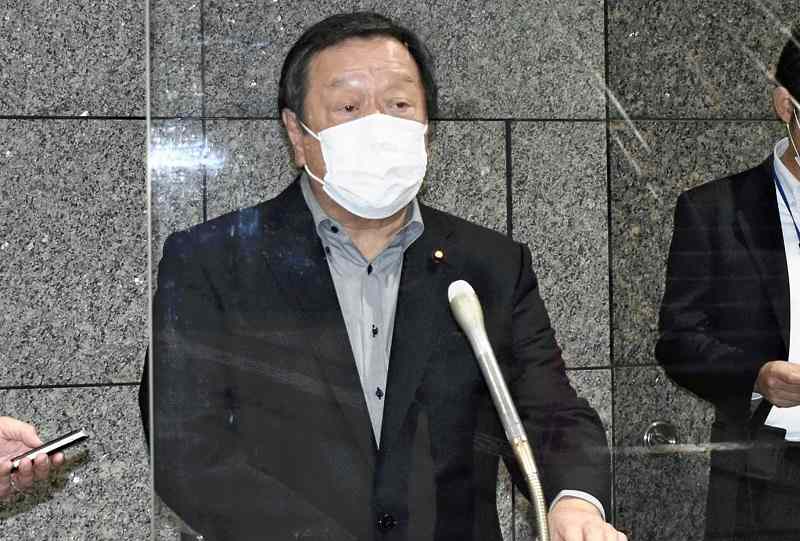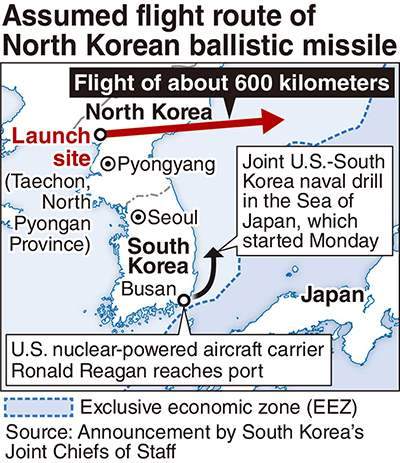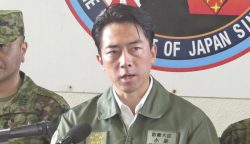
Defense Minister Yasukazu Hamada speaks to reporters about a missile launched by North Korea, on Sunday at the Defense Ministry in Tokyo.
1:00 JST, September 27, 2022
The Defense Ministry is on heightened alert following North Korea’s launch Sunday of a ballistic missile that may have flown on an irregular trajectory, making it difficult to intercept.

The government is thus poised to expedite its consideration of possessing “counterattack capabilities” to destroy enemy missile-launch bases and other facilities.
According to the ministry, North Korea has launched 29 ballistic missiles this year — a new annual record.
“In terms of the security of our country and the region, we can’t overlook North Korea’s recent considerable progress in nuclear and missile-related technologies,” Defense Minister Yasukazu Hamada told reporters at the ministry on Sunday.
The missile is said to have flown at a lower altitude than usual, making it difficult for ground-based radar to detect.
Since May 2019, North Korea has launched a series of new short-range ballistic missiles capable of flying at low altitudes and on irregular trajectories. It has also diversified its launching methods, including the use of railways and submarines.
Pyongyang has also conducted “lofted trajectory” tests, in which projectiles are launched at higher angles than usual. In June, the North launched eight missiles almost simultaneously to improve its “saturation attack” method, which aims to penetrate a target country’s missile defense network.
The government plans to revise three defense and security-related documents — including the National Security Strategy — by the end of the year.
“We’ll consider all options, including counterattack capabilities, and work to drastically strengthen our defense capabilities.” Hamada said.
Also Sunday, Takehiro Funakoshi, director general of the Foreign Ministry’s Asian and Oceanian Affairs Bureau, held telephone talks with Sung Kim, the U.S. special representative for North Korea, and Kim Gunn, South Korea’s special envoy for peace and security affairs on the Korean Peninsula, respectively. The three countries agreed to coordinate closely on the issue.
Top Articles in Politics
-

Japan PM Takaichi’s Cabinet Resigns en Masse
-

Sanae Takaichi Elected Prime Minister of Japan; Keeps All Cabinet Appointees from Previous Term
-

Japan’s Govt to Submit Road Map for Growth Strategy in March, PM Takaichi to Announce in Upcoming Policy Speech
-

LDP Wins Historic Landslide Victory
-

LDP Wins Landslide Victory, Secures Single-party Majority; Ruling Coalition with JIP Poised to Secure Over 300 seats (UPDATE 1)
JN ACCESS RANKING
-

Japan PM Takaichi’s Cabinet Resigns en Masse
-

Japan Institute to Use Domestic Commercial Optical Lattice Clock to Set Japan Standard Time
-

Israeli Ambassador to Japan Speaks about Japan’s Role in the Reconstruction of Gaza
-

Man Infected with Measles Reportedly Dined at Restaurant in Tokyo Station
-

Videos Plagiarized, Reposted with False Subtitles Claiming ‘Ryukyu Belongs to China’; Anti-China False Information Also Posted in Japan






















